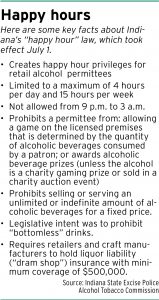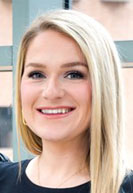Subscriber Benefit
As a subscriber you can listen to articles at work, in the car, or while you work out. Subscribe Now“Happy hour” made its return to Indiana in July, with the state’s restaurants and bars able, with limits, to market drink specials during specific times of the day to their customers.
A new state law, House Enrolled Act 1086, revived the offering of those discounted specials for Hoosiers and lifted a ban that had been in place since the mid-1980s.
Retailers are still deciding what effect happy hour is having on their bottom line, with some restaurants and bars still on the fence about whether the specials are worth it.

Rep. Jake Teshka, R-South Bend, author of the happy hour law, said the bill came out of conversations with local restaurant and bar owners in his legislative district regarding the declining business they’d seen following the COVID pandemic.
Those conversations started in 2022, Teshka noted, although there had also been some discussions prior to COVID about bringing happy hour back to Indiana.
Teshka said he’s seen positive results from the new law in his district through anecdotal accounts from mom-and-pop restaurants and bars that have seen increased sales with their happy hour specials.
The South Bend representative said he goes with his family to a favorite local Tex-Mex restaurant where there are discounted margarita specials for happy hour as well as “cocktail-to-go” purchases in sealed containers.
“It’s really kind of cool to see those things take place,” Teshka said.
 Economic impact of new law
Economic impact of new law
The new law limits happy hour times to a maximum 4 hours per day and 15 hours per week, with drink specials not allowed from 9 p.m. to 3 a.m.
There are also prohibitions on games involving the quantity of alcoholic beverages consumed by a patron or the awarding of alcoholic beverage prizes (unless the alcohol is charity gaming prize or sold in a charity auction event).
Also, participating retailers and craft manufacturers are required to hold liquor liability insurance with minimum coverage of $500,000.

Abbi Raben, the Indiana Restaurant and Lodging Association’s director of government affairs, said her organization has not compiled any hard data yet on what the new law’s economic impact has been in terms of sales.
“It might be a little early,” Raben said.
She said a lot of the association’s members are taking advantage of the new law, but she acknowledged not everybody is on board yet as far as implementing their own specials.
She said the purpose of the new law was to boost business and allow some autonomy with restaurant and bar owners, but to also make sure happy hour was done in a safe manner with hour and time-of-day limits.
“I do think the desired effect (of the law) is being met,” Raben said.

Chris Martin, president of Finney Hospitality Group, described the new law as probably the biggest change to the state’s alcohol laws in the last 40 years.
Martin said his company operates nine restaurants in Indiana. At all nine, there were happy hour specials in place the first day the new law went into effect.
“We went without for so many years,” Martin said.
In terms of popularity, Martin said happy hour is “kind of a mixed bag” across all of the company’s locations, where specials run from 3-6 p.m. Monday through Friday.
Customers weren’t necessarily asking about the possibility of happy hour returning to Indiana before the state legislature passed HEA 1086 earlier this year, Martin acknowledged.
Martin said these happy hour specials, which include alcohol and food offerings at Finney’s sites, are about one-third of the way through an internal review process, with Finney not looking to make any adjustments before the summer of 2025.
“There’s still a lot of time to figure it out,” Martin said.
‘Cocktails-to-go’
HB 1086 also legalized carry-out/“to-go” alcoholic beverages. Prior to the law, the carrying out of any alcohol except in its original package/container was illegal.

James Morrison, senior finance director at Hacienda Restaurants Inc., said the company has 14 restaurants statewide but can only sell alcohol at 13 of its locations, with one restaurant in a special liquor license district.
At Hacienda’s participating locations, the restaurants are offering happy hour specials Monday through Friday from 2-4 p.m. and only utilizing 10 hours per week.
Morrison said the restaurants are using the specials on frozen margaritas to help fill “lull periods.”
“We didn’t think we’d blow the top off,” Morrison said.
Hacienda’s cocktails-to-go have performed well, Morrison said.
He said customers had been asking for frozen margaritas-to-go for years, partly because Hacienda’s restaurants had offered a “make-your-own” margarita kit.
Now, the restaurants can offer margaritas that are already mixed.
Morrison said the margaritas-to-go have been popular from the start, with the company almost running out of supplies during an exceptionally busy Fourth of July weekend.
Four months in with the new law, the demand for Hacienda’s cocktails-to-go hasn’t waned, Morrison said.
“We’re excited to see what this holiday season brings for cocktail-to-go sales,” Morrison said.
For restaurants and bars that aren’t doing cocktails-to-go, Morrison said the new law’s packaging requirements may play a part.
A to-go beverage must be sealed within a qualified container by a permit holding restaurant or bar. A qualified container is defined as a bag of which has a total liquid capacity of less than four quarts, can be fully closed off once sealed, and is appropriately labeled as containing alcohol.
Non-participating sites may not be able to find packaging that conforms to the law’s regulations, Morrison said.
Morrison said Hacienda has good package sourcing through a food service vendor, making it easier for the company.
Hacienda ran all of the packaging it planned to use by the state’s Alcohol and Tobacco Commission to get the agency’s stamp of approval, he added.•
Please enable JavaScript to view this content.


We really overcomplicate things in Indiana. We require insurance. Stop there, get out of the prohibition game.
Requiring insurance and then walking away from other risk mitigation will result in the situation found in many states, where the price of dram shop liability insurance is too high and bars can’t afford it.
Left to their own devices, many bar owners will engage in whatever conduct they believe will give them some minor edge in securing customers.
Violating requirements in an insurance policy frequently doesn’t bring about consequences, as courts are reluctant to allow injured parties to be precluded from insurance benefits. So, courts don’t enforce the provisions and conditions of insurance policies (because really, who wants to support the insurance industry), the company has to pay, and there are few reprecussions to the bar owner or staff.
Statutes have teeth…illegal actions are not insurable, and should result in the bar being shut down (unless the bar’s attorney has the local ABC group wrapped around his or her finger).
“Chris Martin, president of Finney Hospitality Group, described the new law as probably the biggest change to the state’s alcohol laws in the last 40 years.”
Seems Chris forgot we didn’t have Sunday sales until 2018.
Braun professes the desire to make Indiana more (!) conservative. This change seems to pint in the opposite direction. Conservative, one must assume, has varied definitions.
Was “pint” an intentional pun?
What conservatives stood for 30 years ago is long gone.
What conservative stands for now is rolling back any changes to the laws of this country since FDR was president. They want everything except the tax rates from that era.